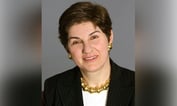With President Obama re-elected, there is much talk of Cabinet members and Federal agency chiefs leaving their posts. For advisors, what could be the most significant leave-taking is already in the works: Mary Schapiro will depart the SEC on Dec. 14. However, for many advisors and their clients, and for many investors who have been plowing money into bonds, another significant departure would be if Ben Bernanke were to leave the Fed.
Bernanke’s term as chairman of the Federal Reserve ends on Jan. 31, 2014, but according to a New York Times report last month, “Mr. Bernanke has told close friends that even if Mr. Obama wins, he probably will not stand for re-election.”
 Sam Wardwell (right), VP and investment strategist at Pioneer Investments, said in a Nov. 29 blog that when he was asked about the impact of Bernanke being replaced, he saw three scenarios under which rates “might rise significantly.”
Sam Wardwell (right), VP and investment strategist at Pioneer Investments, said in a Nov. 29 blog that when he was asked about the impact of Bernanke being replaced, he saw three scenarios under which rates “might rise significantly.”
Scenario 1: A Change in the Fed’s Basic Approach
First, Wardwell believes that Obama would ask Bernanke to stand for a third term as Fed chairman. Were he to decline, however, “Obama is very likely to replace him with another dove,” with current Fed Vice-Chairman Janet Yellen as the leading candidate.
Regardless of who replaces Bernanke, the Fed’s mandate under Humphrey-Hawkins (under which the Fed chairman reports to Congress twice yearly)—to keep both inflation and unemployment low— “still militates for low rates, and will probably do so until the unemployment rate falls far enough,” in Wardwell’s estimation, “well below 7%,” to the point that “’labor’ becomes scarce enough that unit labor costs start to outpace inflation. With that mandate still in place, the bottom line for Wardwell: the risk of the Fed stepping on the brakes in 2013 appears small.”
Wardwell provides a postscript to his conclusion on Scenario 1: “I expect this scenario, if it plays out, to result in an inflationary boom: falling unemployment => rising wages => rising consumer spending => strong GDP => strong profits, etc. In that scenario, stocks should outperform bonds, and corporate spreads should tighten until the Fed steps on the brakes.” What, exactly, would constitute “stepping on the brakes?” It wouldn’t be “raising rates to 1%,” Wardwell believes, but only “when the Fed Funds rate is materially higher than the inflation rate (2%).”
Scenario 2: A Shift in Investor Sentiment








 November 30, 2012 at 09:37 AM
November 30, 2012 at 09:37 AM










